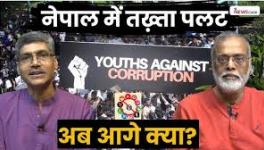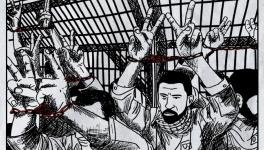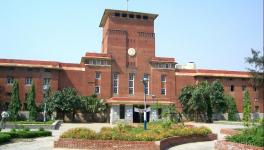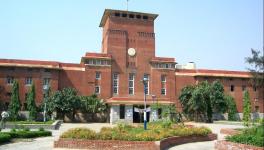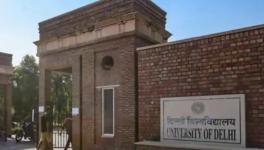St Stephen’s Collaborates with Zionist Whitewashing as Palestinians Face Violence
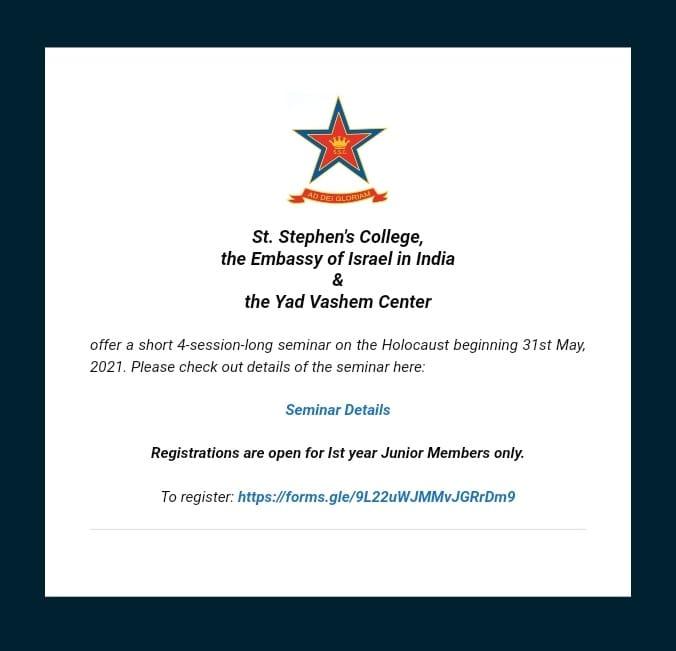
On May 30, the student newspaper DU Beat flagged an upcoming four-part seminar on the Holocaust, at St Stephen’s College, Delhi. Organised in collaboration with the Embassy of Israel in India and the Yad Vashem Centre, Jerusalem, the seminar was scheduled for Mondays and Wednesdays over the next two weeks. Is it even valid, wondered the Beat’s writer. Do the authorities at St Stephen’s have an ounce of sympathy for the Palestinians? Why had the college lent itself to Israel’s use of the Holocaust to win impunity for itself against the Palestinians?
It was barely a week since the bombardment of Gaza had left hundreds of Palestinians dead, some 2,000 injured, up to 8,500 displaced, many hospitals, residential blocks and media offices destroyed. The weaponisation of the Holocaust had been made explicit the previous month, when Israel’s then prime minister, Benjamin Netanyahu, picked the occasion of Holocaust Day (April 7) to take a belligerent stand against Iran, declaring that Israel felt under no obligation to honour an internationally agreed nuclear deal with the Islamic Republic.
Do the authorities at St Stephen’s have an ounce of sympathy for the Palestinians? Why had the college lent itself to Israel’s use of the Holocaust to win impunity for itself against the Palestinians?
The college authorities could hardly have failed to recognise the moral implications of their choice, especially as they had received some prompt and sharp feedback from the students. In a Facebook post of May 27, the institution’s Gender Studies Cell had argued against collaborating with a state accused of settler colonialism, ethnic cleansing and apartheid. The Yad Vashem Centre, the post added, is built on occupied land, while its current chairman, Effi Eitam, is a former brigadier general with a known record of human rights abuses. (In December 2020, when Eitam was appointed chairman of the Centre, the Israeli daily Haaretz had asked its readers to imagine his many bigoted and violent statements being uttered in German; further, to imagine them framed behind his chair at the Holocaust Remembrance Centre.)
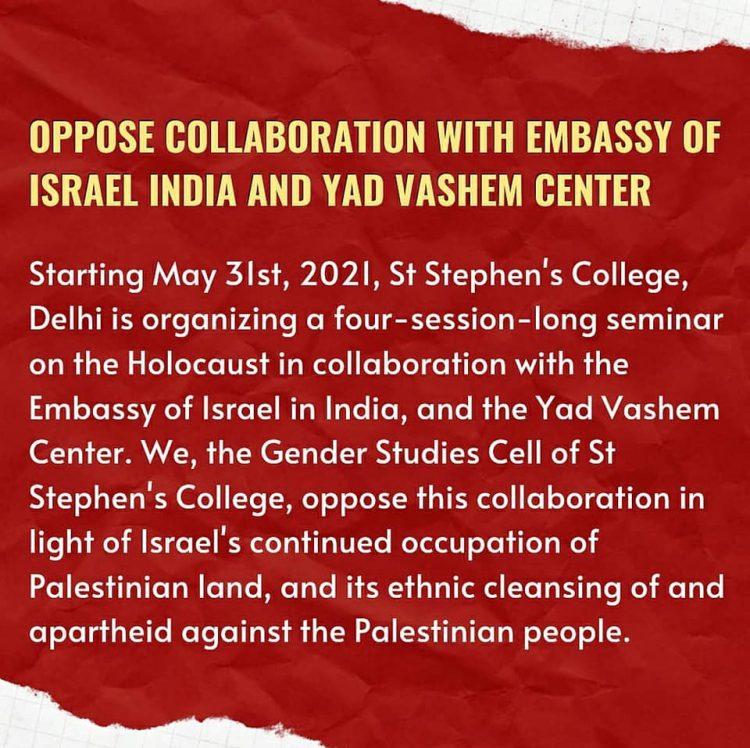
Image taken from Facebook
Yet, the authorities at St Stephen’s chose not to be guided by the students. The seminar was evidently sprung without warning on the community because their first responses to it arrived days before it was to begin. According to an unconfirmed report 40 students attended the four sessions. At the first one, on May 31, they were scheduled to learn of Yad Vashem’s role in “shaping memory, transmitting history”. The previous day, Ahmed Fahd, 24, had been arrested at dawn by Israeli undercover agents, then shot several times in the back at close range and left to bleed to death on a road in Ramallah. Fahd was to have been married in a few weeks. His memory and history are marked by his mother’s kunya (genitive name), Um Fahd, and her broken voice: “He was a loving son who had many friends and was always smiling.” She will remain Um Fahd, her name shaped around this memory of state brutality, the murder of her firstborn.
On June 11, two days after the St Stephen’s seminar, Israel closed the case against at least ten police officials who were filmed abusing the prisoners. This footage does not figure in the Museum’s collection of records.
On Wednesday, June 2, the Stephanian participants were meant to take a virtual tour of the Holocaust History Museum. Like many before them, they would have experienced the awe, disquiet and profound grief that Moshe Safdie’s design evokes, with its shadows, expanses, voids, cones, shifting perspectives, the ways that the structure is built around human suffering and loss. As they viewed the galleries, were any of the youngsters reminded of video footage from Wing 3 of the Ktzi’ot prison? It shows 55 Palestinian prisoners bent over on the floor, restrained for hours, punched, kicked and beaten with batons by Israeli guards. On June 11, two days after the St Stephen’s seminar, Israel closed the case against at least ten police officials who were filmed abusing the prisoners. This footage does not figure in the Museum’s collection of records.
Monday’s theme, on June 7, was “the live Holocaust”, the testimony of a survivor. It was also the day 13 Palestinian families in occupied East Jerusalem were served eviction notices. Their homes in the Silwan neighbourhood will be demolished by the end of this month. Some 120 Palestinian families, 1,500 people, face eviction from the area. A religious theme park is to come up where their homes stand. The park will commemorate the site of King David’s legendary garden. Many Palestinians do not receive any notice of eviction — they wake up to the sound of demolition machinery outside their door. Again, June 7 was when Israel’s attorney general informed the country’s supreme court that his office will not be intervening to prevent evictions from Sheikh Jarrah.
While St Stephen’s College joins the long list of institutions offering stage to Israel and its institutions to whitewash its crimes, far stronger is the growing collective strength of progressive Jewish voices linking their historical and ongoing trauma and violence with that of Palestinians.
In the intervening night of November 9-10, 1938 Nazi stormtroopers carried out pogroms against Jews throughout Nazi Germany. Kristallnacht or the Night of Broken Glass, referring to the shards of broken glass that littered the streets from the smashed windows of Jewish-owned stores, buildings and synagogues, is often seen as the beginning of the Holocaust. Jewish Voice for Peace, a US based progressive Jewish organisation compared the attacks by Zionist lynch mobs across historic Palestine last month to Kristallnacht. While St Stephen’s College joins the long list of institutions offering stage to Israel and its institutions to whitewash its crimes, far stronger is the growing collective strength of progressive Jewish voices linking their historical and ongoing trauma and violence with that of Palestinians, building alliances and advocating for Boycott, Divestment and Sanctions against Israel until it respects Palestinian rights.
The Nakba, or catastrophe, lives on; it too is part of Israeli history. The Yad Vashem stands a mere couple of kilometres from what used to be the village of Deir Yassin, where Zionist militias massacred over 200 Palestinian men, women and children, shortly before Israel declared itself as a state. The atrocities of the present do not cancel out those of the past; nor can those of the past do so to the present. Unfortunately, Israeli state propaganda operates by a divisive logic in which the experience of one set of victims excludes another.
The concluding session, on June 9, had the theme of “woman in the Holocaust”. Although Palestinian women have much in common with the historical experiences of Jewish women — not least the double burden of resistance and survival within patriarchy — what kinship can they feel when they too are alienated from property and history on the basis of religion and ethnicity, penned into ghettoes, deprived of freedom? Does the Yad Vashem address them about shared human suffering and loss, speak to them against inhumanity? Can it do so?
The atrocities of the present do not cancel out those of the past; nor can those of the past do so to the present. Unfortunately, Israeli state propaganda operates by a divisive logic in which the experience of one set of victims excludes another.
Curiously, in the days leading up to the seminar, the principal of St Stephen’s College was arguing publicly for contextualisation. When his letter on the death of Satyam Jha — a student at the college who died of COVID-19 on May 25 — was widely quoted in the press for its criticism of “blind leaders who are immune to the suffering and deaths of simple people”, John Varghese hastened to clarify that he had not intended it as a reference to any political party or agenda. He asked that “every communication be treated in its entirety, paying full attention to the context in which it is made”, a lesson he would have done well to apply to his plans with the Israel embassy and the Yad Vashem Centre. “We are veering off dangerously to becoming a cruel and insensitive race,” his tribute to Satyam Jha had stated. Perhaps attending the seminar will have educated him on the political toxicity of the word “race”, and taught him that words, as much as institutional decisions, have a political import that cannot be wished away.
Courtesy: Indian Cultural Forum
Get the latest reports & analysis with people's perspective on Protests, movements & deep analytical videos, discussions of the current affairs in your Telegram app. Subscribe to NewsClick's Telegram channel & get Real-Time updates on stories, as they get published on our website.













